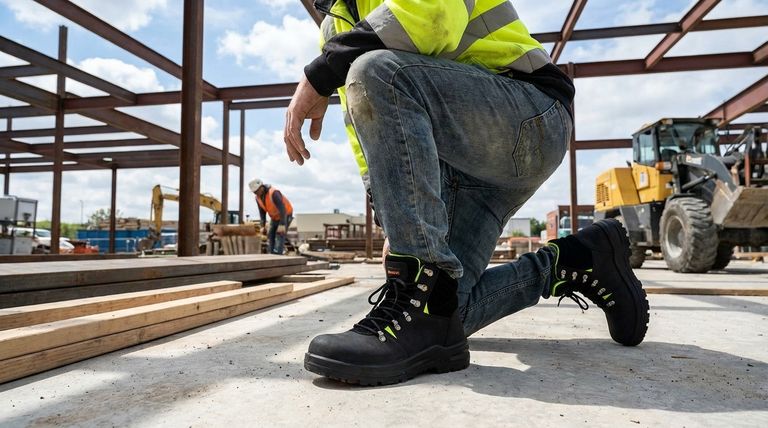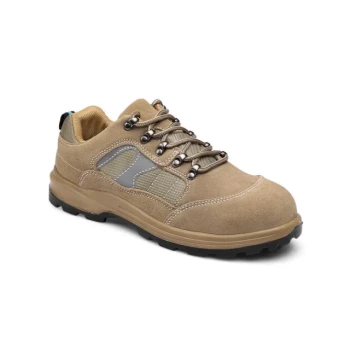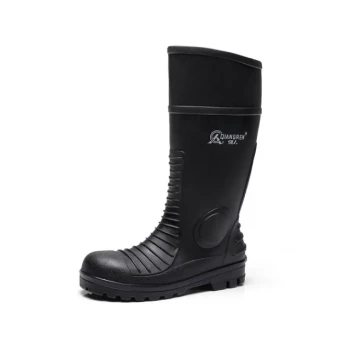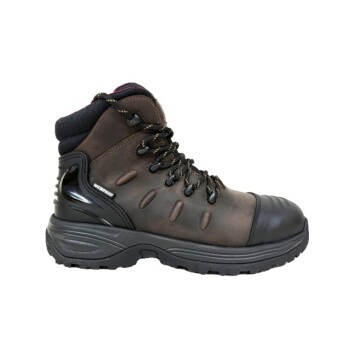In short, employers are not required to pay for safety shoes when the footwear is considered "non-specialty" and the employee can reasonably wear it outside of the workplace. This primary exception is based on the idea that if the footwear has personal use beyond the job site, the financial responsibility can shift from the employer.
The core principle behind OSHA's payment rules is the distinction between single-purpose, job-specific Personal Protective Equipment (PPE) and durable footwear that an employee can use personally. If the safety shoe is a standard item usable off-site, the employer may not have to pay for it.

The General Rule: Employer Responsibility for PPE
Before examining the exceptions, it's crucial to understand the foundation of the rule. OSHA mandates that employers must protect their workers from workplace hazards.
The Hazard Assessment is Key
The entire process begins with a formal hazard assessment. If this assessment identifies foot injury risks that necessitate safety footwear, the employer is responsible for ensuring employees wear it.
The 2008 Payment Mandate
Since a 2008 clarification, OSHA requires employers to pay for mandatory PPE. This rule was established to prevent the cost of safety equipment from being a barrier to its use. The exceptions for footwear are specific and narrowly defined.
Key Exceptions to the Payment Rule
While the general rule is that employers must pay, several specific situations absolve them of this financial responsibility for safety footwear.
The "Non-Specialty" Footwear Exception
The most significant exception is for non-specialty, safety-toe footwear. This refers to standard steel-toe boots or shoes that are widely available and not designed for a unique, job-specific hazard like molten metal or high-voltage electricity.
The "Everyday Wear" Clause
This exception is closely tied to the first. If the non-specialty safety shoes are of a type that employees can and do wear off the job site, the employer is not required to pay for them. The footwear is seen as having personal utility beyond the workplace.
The Metatarsal Guard Alternative
Employers are not required to purchase safety shoes with built-in metatarsal protection if they provide separate, attachable metatarsal guards at no cost to the employee. The employer’s obligation is to provide the protection, not necessarily in its most integrated or expensive form.
Common Pitfalls to Avoid
Navigating these exceptions requires careful consideration to ensure compliance and avoid disputes.
Defining "Specialty" vs. "Non-Specialty"
The line between specialty and non-specialty can be a gray area. A basic steel-toe boot is clearly non-specialty. However, footwear with added features like chemical resistance, electrical hazard ratings, or puncture resistance is almost always considered specialty PPE that the employer must pay for.
Lost or Damaged Footwear
An employer is not required to pay for replacement safety footwear if an employee has lost or intentionally damaged the original pair provided by the company. This exception does not apply to normal wear and tear.
The Risk of Inconsistent Policy
Relying on these exceptions can create administrative complexity. A clear, written policy is essential to define what the company will and will not pay for, ensuring fair and consistent application for all employees.
Making the Right Choice for Your Workplace
Your policy on safety footwear should align with your company's risk tolerance, administrative capacity, and safety culture.
- If your primary focus is maximum cost control: You can leverage the "non-specialty" exception, but you must have a crystal-clear policy and ensure the footwear is genuinely suitable for off-site use.
- If your primary focus is compliance and simplicity: The safest and administratively easiest path is to pay for all required safety footwear, which eliminates ambiguity and ensures no employee goes without protection due to cost.
- If your work requires unique protection (e.g., chemical, electrical): This is unequivocally specialty PPE, and you are required to pay for it without exception.
Understanding these distinctions allows you to create a compliant and fair policy that protects both your employees and your business.
Summary Table:
| Exception | Description | Key Condition |
|---|---|---|
| Non-Specialty Footwear | Standard safety-toe shoes/boots (e.g., basic steel-toe) | Employee can reasonably wear them outside of work |
| Everyday Wear Clause | Footwear has personal utility beyond the job site | Must be widely available and not job-specific |
| Metatarsal Guard Alternative | Employer provides attachable guards instead of built-in protection | Guards are provided at no cost to the employee |
| Lost/Damaged Footwear | Replacement is not required if loss/damage is intentional | Does not apply to normal wear and tear |
Need Compliant, High-Quality Safety Footwear for Your Team?
As a large-scale manufacturer, 3515 produces a comprehensive range of safety footwear for distributors, brand owners, and bulk clients. Our production capabilities encompass all types of compliant safety shoes and boots, from non-specialty steel-toe models to specialized footwear for chemical, electrical, and other unique hazards.
Partner with us to:
- Ensure your workforce has reliable, OSHA-compliant protection
- Simplify procurement with a single source for all your safety footwear needs
- Access durable, cost-effective solutions tailored to your industry's risks
Let's discuss your requirements and ensure your safety program is fully supported. Contact our team today for a consultation and quote.
Visual Guide

Related Products
- Heavy-Duty Waterproof Nubuck Safety Boots Safety Shoes for Bulk Supply
- Wholesale Safety Boots Manufacturer for Custom & Private Label Orders
- High Performance Fire-Retardant Waterproof Safety Boots
- Premium Waterproof Nubuck Safety Boots for Wholesale
- Wholesale Customizable Safety Boots Durable & Protective Footwear Manufacturing
People Also Ask
- What is unique about a carbon composite toe? Maximum Protection with Minimal Weight
- Why are industrial-grade safety shoes essential for thermal power plants? Protect Your Team From High-Heat & Impact Risks
- How does professional safety footwear support occupational health in mining? Enhance Site Safety with 3515 Gear
- Why are professional-grade non-slip safety shoes critical for delivery work? Enhance Rider Safety & Stability
- Why is an Inertial Measurement Unit (IMU) integrated into smart assistive footwear? Unlocking Precision Navigation
- What additional protections does S1P provide over S1? The Crucial Safety Feature You Need
- What role do industrial safety shoes and protective gaiters play in monitoring bricklayer movements? Data Meets Safety
- What type of safety boots should a general construction worker wear? Choose the Right Boot for Maximum Protection



















